Words May Not Come Easily When You’re Saying Goodbye To a Dying Loved One
Author note: This article was written 372 days after my adorable Mom, Gertie, died. I’d been thinking of writing it ever since my she left us on Feb 15, 2012. I finally felt strong enough to share my words, feeling, and emotions as I eased her down her next path. Edited: March 14, 2016.
I don’t profess to be a specialist in the field of dying, although, with the year I’d had, you’d think I’d be pretty good at it. Just 91 days after my 95 year old Mom took her last breath, I had to let one of my best friends go – my 3-legged dog, Hops. And, then, on the first anniversary of Mom’s death, I had to again face the stark realization that another of my best friends, my very first failed foster dog, Barley, had to be put to sleep.
Now, all three of these much cherished loved one had led full lives, as I mentioned, Mom was 95, Hops was 15 (pretty good for having just 3 legs) and Barley was 16. So, although the timing was horrible for the dogs, and although my heart was heavy with sadness, I knew that, as my Mom would say, “These things happen.”
As my Mom’s full-time caregiver, I spent a lot of time with her, especially those last, very long three days when she was in and out of consciousness. Luckily for me, when she came to, she still had her humor and compassion.
At 3 am in the morning on the day she died, I was standing by her bed watching her every movement. I stood there memorizing her face and marveling at how relaxed she was. I took her hand and just stood quietly as I knew the end was near. After about 30 minutes, my darling Mom roused, looked at me and said “Lori, go get some rest. I’ll see you in the morning.” Even in my Mom’s last moments, she was more concerned for me than for herself.
I shall never forget that moment as I gave her one last kiss and took my leave. I told her that I would see her in the morning, and I did. I was with her that same morning at 7:11 am as she took her last breath. And, for that, I”ll be forever grateful.
Few people know really what to say to a dying loved one. I’m here to help you sort through some of the words you might want to say but are hesitant to utter. Come with me as we explore how to say goodbye to a dying loved one.
And, for those of you who might be unfamiliar with the process of dying, I’ve written this article (just click on the link): When Death Looms – The Signs And Symptoms Of The Last Moments On Earth
Hearing Is The Last Sense To Go So Be Kind When Saying Goodbye To A Dying Loved One
I spent a lot of time speaking softly to my Mom, even when she was in and out of consciousness those last three days. I spoke to 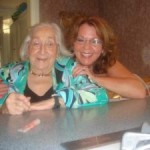 her about what a fantastic woman, mother and role model she was for me (note: I always used the present tense).
her about what a fantastic woman, mother and role model she was for me (note: I always used the present tense).
I told her how loved she was and how much I appreciated all she had taught me, particularly during the last five years when she helped me become a good caregiver.
I spoke of how much I enjoyed spending the last five years with her – how lucky I was to have had her in my life. I told her how grateful I was that she accepted my very significant other (my husband as of June 15, 2016), John, into our lives. How thankful I was that she met him and loved him as much as I did.
And, I told her to please tell my Dad and sister who left us much to soon that I love them. I believe to the depth of my soul that, if she was able, she carried on that message.
Your loved one can probably hear you, even when you think they can’t. Regardless, voice nice thoughts. This is not the time to speak of disappointments, missed moments, anger, etc. Speak as you would want to be spoken to when you approach your own death. If you have any apologies to utter, now is the time to settle the business.
It’s OK To Let Your Dying Loved One Know The Time Is Approaching
 Sometimes, the dying understand that the end is near, but no one will talk with them about it. After my Mom broke her hip, she muttered “Let me go” many times as she faded in and out of consciousness. I couldn’t quite understand what this meant although I did think that she was struggling with being immobilized due to her broken hip. In looking back, I think that Mom may have been signaling me that she was ready to move past this world and into wherever we go.
Sometimes, the dying understand that the end is near, but no one will talk with them about it. After my Mom broke her hip, she muttered “Let me go” many times as she faded in and out of consciousness. I couldn’t quite understand what this meant although I did think that she was struggling with being immobilized due to her broken hip. In looking back, I think that Mom may have been signaling me that she was ready to move past this world and into wherever we go.
As Mom’s health worsened, I had a few frank talks with her where I told her it was ok for her to go. I told her that I had the best man I could ever imagine beside me, and I would be fine. I told her that she and Dad had prepared me well to live the rest of my life without them. I would be fine.
Sometimes, the dying will hold on until those they’re leaving have let them know that it’s ok to go. It’s a difficult talk for sure but may well be necessary, particularly if your loved one is unsettled or appears uneasy.
The dying might also ask you if they’re dying. Since no one can tell when someone is going to die (even seasoned Hospice workers), you might answer with something like, “I don’t honestly know. How are you feeling?”
My Mom was the most special woman I’ve never known and her mate, my Dad (in the photo above) was equally exquisite.
Books To Help You Talk To Those Who Are Dying
I’m never one to shirk book smarts so, when Mom entered the last phase of life here on earth, I wanted to know how to ease her passing. I bought a few books that schooled me on what to say.
&
Final Gifts: Understanding the Special Awareness, Needs, and Communications of the Dying Dying Well: Peace and Possibilities at the End of Life
Dying Well: Peace and Possibilities at the End of Life The Needs of the Dying: A Guide for Bringing Hope, Comfort, and Love to Life’s Final Chapter
The Needs of the Dying: A Guide for Bringing Hope, Comfort, and Love to Life’s Final Chapter Being with Dying: Cultivating Compassion and Fearlessness in the Presence of Death
Being with Dying: Cultivating Compassion and Fearlessness in the Presence of Death
Assure Your Love One That You’ve ‘Got It Covered’
My Dad was fine the last time I saw him, just two weeks before he died. He died sort of “suddenly”, well, as suddenly as an 89-year-old man can.
He got sick at 11 pm on April 4, 2007, went to the hospital four hours later and died right then. There was no warning, no long goodbyes, no painful ending. None of that. He just died. I consider this type of death “winning the game.” There was no pain, no lingering, no sadness on his part. He just died. Although it was a tough for me, especially since I was to comfort my elderly Mom, I was content in that he knew how we’d carry on. We had a plan.
You see, I had spoken to Dad many times of what we expected after he was gone. He’d had open heart surgery at 68 years old. The doctors gave him 10 years – he lived 26 more. But, during those 26 years post-op, Dad and I spoke often of the plan for Mom if he should die before she did. My older sister had died at just 36 years of age so I was next to up bat.
I assured Dad many times that, no matter who was left behind, they would live with me as long as I could ensure their safety. So, Dad knew prior to his death that Mom would become my priority. And she was. I believe he rested easier knowing that Mom’s future (if there was one) was set. At least, I hope he did.
Understand That The Dying Might Lose Their ‘Filter’
We’re all taught, throughout our life, to “filter” what comes out of our mouth – albeit, some of us are better than others (ok, so I’m unveiling everything here – I don’t have the most evolved filter of those I know….) But, as the dying are entering the last stages of life, the “filter” may not be engage (after all, they are the dying and may just have other things on their mind than censorship).
Just as children speak the truth, the dying may also speak exactly what they think. Although some of their words may appear hurtful, try not to take these unfiltered thoughts personally.
I’ve known a few people (sadly, they were relatives) who have taken great offense at the “unfiltered” thoughts of those who are dying – this only brough great resentment from me as I was very protective of my Mother, dying or not.
Try to remember that this time is not about you, but about your dying loved one. Those who think that it’s about them are acting in an incredibly selfish manner.
What NOT To Say To Someone Who Is Dying
When someone you love is dying, you might run out of words. But, whatever you do, don’t say these – these thoughts and words are just not helpful and can cause resentment and pain to those who are not far from death:
- It’s God’s will. I don’t think this is a particularly helpful sentence to say to someone who is dying, regardless of whether they’ve lived to a ripe old age like my Mom or is a younger person dying of a disease.It might be God’s will to you but, to them, it might be unfair, painful, and invoke a host of other emotions. Even if they are religious, do not utter these words.If you must, substitute a simple, ‘I’ll pray for you.’
- You’ll be fine. Lying is never a good thing to do but especially can be hurtful to those who know there is not chance of recovery.
- Stay strong. Those dying don’t necessarily have to stay strong – we need to give them room to voice their fears, their feelings, their sorrows.Telling someone to “Stay strong” doesn’t help them at all. And, if they are a person who is known for their inner strength, telling them to ‘stay strong’ when their body has other ideas can be very hurtful – they may feel like they’re failing by dying.
- What will I do without you? An incredibly selfish sentence, you’re putting a sense of guilt on those who are dying. The last thing they need is to leave this world feeling unsettled.
Make Your Own Peace With Your Dying Loved One’s Impending Death
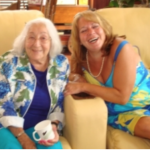 In the end, as your loved one approaches death, you’ll need to make peace with the situation.
In the end, as your loved one approaches death, you’ll need to make peace with the situation.
I’ll never forget the first time I spoke with my Mom on the phone after my Dad died fairly suddenly – her exact words to me were “There things happen.” Those wise words will carry me throughout the rest of my life. “These things happen.” Three words that mean as much to me as “I love you.”
To those of us who have been caregivers, the end might well feel like relief – relief that feels like guilt. I was up three days prior to Mom’s death with the briefest of catnaps when I was certain she rested easy. I had been by her side pretty much for the past five years. I was exhausted. Pooped. Done. And, yes, I felt a sense of relief; relief that her struggle was over and relief that mine was too.
I remember feeling incredibly guilty over this sense of relief and struggled with the emotion for quite a while. But, I’ve since come to understand that this sense of relief is totally normal.
After my Mom died, I was lucky enough to run away for six weeks to a rented house in Key West where I started to heal. My heart was broken, but the memories of living and caring for Mom soon became some of my favorite memories. The guilt faded and the love came back through.
My Mom’s death was expected; she was 95. When Steph, my sister, died unexpectedly in a car accident at just 36 years of age, I had a much harder time making peace with her death than making peace with Mom’s.
After all, Steph was leaving three young children behind. Meanwhile, I had no children. I questioned why she was taken and not me. I also was left with an unsettling feeling as my sister wasn’t particularly in a good spot in her life when she was taken. But, by and by, I came to understand that “these things happen.” Stephanie is well missed to this very day.
The point of that story is that it may take you a while to come to peace with the death. I know people who never get over the grieving but that’s not a tribute to those who have passed at all. The tribute is to go one and live a full, loving life with the lessons that they taught you.
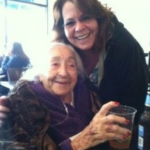 Trust In Your Own Instincts; The Words Will Come
Trust In Your Own Instincts; The Words Will Come
Trust in your instincts when speaking to the dying – in my own case, as Mom neared death, I was able to continue to share a sense of humor with her. One of her frequent musings was “Don’t buy me green bananas.”
A lot of people might think I was being crass but, in the end, I was just being the daughter that my Mom raised me to be – especially one time when I was convinced she was dying of pneumonia and I leaned in and whispered “Tell Dad to send money….” I know, I know – please don’t slam me in the comment section below.
My parents taught me to deal with the successes and failures of life lightly, with humor. I consider it a legacy to Gertie to continue on with the wit which we shared.
BTW, that picture above was taken on our last outing to lunch just ten days before Mom died. As I recall, she didn’t eat much of her sandwich but she finished her beer….That was my mama, through and through.

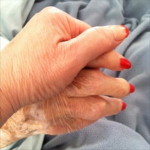
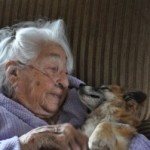
This is by far the best article I’ve read on this subject. I say that as one who has watched two people (Mom and Mom-in-Law) die of cancer. I was Mon’s primary caregiver during the last few months, and the one who gave moral support and practical help during the years before that after I had moved her closer to me. We became very close during that time, and even closer when she got her prognosis. We only had eight weeks to come to grips with it before she was gone. I especially agree that we need to let those who are dying feel free to talk about it. It’s a journey into strange territory. Who would not want to talk it over with someone close to them? I’ll be passing this on.
Thanks you SO much for the wonderful comment. I’m glad when I can help other caregivers tread a path they might have in front of them. Caregiving was both the most wonderful and most difficult job I’ve ever had. I’m SO glad that I had those 5 years with my mom; so sorry you only had 8 weeks but so glad you took advantage and grew closer.
What a great article. It’s something most of us are gong to have to do at some time or another, after all, “these things happen”.
I found this blog yesterday when searching for zip front housecoats for my mom who is 81 and in isolation in hospital due to recurring C-DIF. You share so much of your heart, as well as tips and links, and I am so grateful. Thank you for your candid posts.
Thank you SO much for the kind remark, Grace. Althought the time I spent as Mom’s caregiver was always a very special time in my life, it become even more special when I hear how my stories help others. It’s the comments like yours that help me really open up and write about the good, the bad, and the ugly (ie, don’t give too much mayonnaise to a 95 year old – bbbbaaaaddddd things happen….).
BTW, did you find what you were looking for?